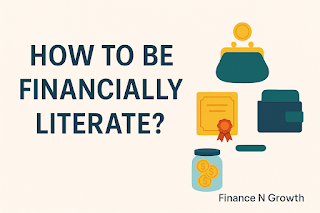In today's fast-paced world, financial literacy isn't just a useful skill — it’s an essential one. Whether you’re saving for a home, planning for retirement, or simply trying to manage monthly expenses, understanding the fundamentals of money management can make the difference between financial security and persistent stress. But what exactly does it mean to be financially literate, and how can you achieve it?
At its core, financial literacy is the ability to understand and effectively use financial skills, including budgeting, investing, and managing debt. It empowers individuals to make informed decisions, avoid costly mistakes, and build a stable future. Fortunately, becoming financially literate is a journey anyone can embark on, regardless of their starting point. Here's how you can begin.
1. Start with the Basics
Before diving into complex financial topics like stock portfolios or tax strategies, it’s crucial to master the fundamentals. Understanding how to budget, differentiate between needs and wants, save systematically, and manage debt forms the foundation of financial literacy. Start by tracking your income and expenses, setting realistic saving goals, and understanding how interest rates work — both for savings accounts and credit cards.
One effective tool to assist you is the 50/30/20 rule: allocate 50% of your income to needs, 30% to wants, and 20% to savings or debt repayment. Simple frameworks like this can help you stay organized and committed.
2. Educate Yourself Continuously
Financial literacy isn't a one-time achievement; it requires continuous learning. Fortunately, there are countless resources available. Read financial Books which offers foundational insights. Podcasts, webinars, online courses, and reputable financial blogs can also provide valuable, up-to-date information.
Stay curious. Follow financial news, pay attention to market trends, and never hesitate to ask questions. The more you know, the better equipped you’ll be to make sound financial decisions.
3. Develop a Healthy Relationship with Money
Many people struggle with money because of underlying fears or misconceptions. To be truly financially literate, you must cultivate a healthy, positive relationship with money. Recognize that money is a tool — not a source of identity or self-worth.
Practice mindful spending. Understand your financial habits and triggers. Are you prone to emotional spending? Do you procrastinate paying bills? Awareness is the first step toward change. Building good financial habits requires discipline, but the payoff is tremendous: peace of mind and long-term wealth.
4. Understand Credit and Debt Management
Credit can be a powerful ally or a devastating enemy, depending on how you manage it. Understanding how credit scores are calculated — and how they impact your borrowing ability — is crucial. Aim to maintain a healthy credit score by paying bills on time, keeping debt balances low, and using credit responsibly.
Moreover, be cautious with debt. Not all debt is bad; mortgages and student loans, for instance, can be considered investments in your future. However, high-interest consumer debt, like credit card balances, can quickly spiral out of control if not managed properly.
5. Start Investing Early
While saving is important, investing is how you truly build wealth. Thanks to the power of compound interest, even small investments made early can grow significantly over time. Learn the basics of different investment options — stocks, bonds, mutual funds, and retirement accounts like IRAs and 401(k)s.
You don't have to be an expert to start investing, but you do need to understand your risk tolerance and financial goals. Consider speaking with a certified financial planner or using robo-advisors to guide your early steps.
Becoming financially literate is one of the best investments you can make in yourself. It fosters independence, reduces anxiety, and opens doors to opportunities you might otherwise miss. Start small, stay committed, and remember: every bit of knowledge brings you closer to financial freedom. Financial literacy isn't a destination — it's a lifelong journey, and the sooner you begin, the greater your rewards will be.







0 Comments